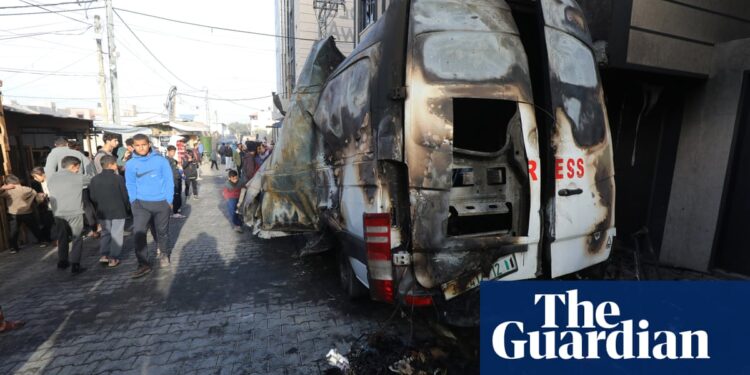Five Palestinian journalists have been killed in an Israeli airstrike on their vehicle in central Gaza, their employer has said, as renewed ceasefire negotiations between Hamas and Israel have reportedly reached an impasse.
Faisal Abu al-Qumsan, Ayman al-Jadi, Ibrahim al-Sheikh Khalil, Fadi Hassouna and Mohammed al-Lada’a were sleeping in their broadcasting truck, marked as press, when it was targeted in a direct strike by the Israeli military, witnesses told Palestinian media. Another 16 people were killed in other Israeli pre-dawn strikes across the territory, the local health ministry said.
The five men, who worked at Al-Quds Today, a television channel affiliated with Palestinian Islamic Jihad, a smaller militant group that fights alongside Hamas, were buried on Thursday morning.
Israel’s military said in a statement it had conducted “a precise strike on a vehicle with an Islamic Jihad terrorist cell inside in the area of Nuseirat”, adding: “Prior to the strike, numerous steps were taken to mitigate the risk of harming civilians.”
The Palestinian Journalists Syndicate said 195 journalists have been killed, including those who died in this attack, and at least 400 have been injured since the war in Gaza began in October 2023, when Hamas launched its attack on Israel.
The Israel Defense Forces denied targeting media workers. However, a Guardian investigation found that amid a loosening of the IDF’s interpretation of the laws of war in the conflict, some in the military appeared to view journalists working in the territory for outlets controlled by or affiliated with Palestinian militant groups to be legitimate military targets.
Since foreign media are blocked by Israel from freely entering Gaza, the task of documenting the war on the ground is carried out only by Palestinian journalists, many of whom have continued to work despite the risks to their safety.
Under the Geneva conventions, a journalist can lose their civilian status if they engage in planning or carrying out combat operations. Working for an organisation such as Al-Quds Today does not make someone a target.
The Middle East branch of the Committee to Protect Journalists said on Thursday that the organisation was “devastated by the reports that five journalists and media workers were killed inside their broadcasting vehicle by an Israeli strike”.
“Journalists are civilians and must always be protected,” it said on social media.
About 1,200 people, most of them civilians, were killed during Hamas’s attack on Israel on 7 October 2023, and 250 taken hostage. About 100 hostages remain in Gaza, about a third of whom are believed to be dead.
More than 45,000 people have been killed, more than half of whom are women and children, in Israel’s ensuing war on the Gaza Strip, according to the local health ministry, which the UN relies on for data on deaths.
The war has triggered a humanitarian crisis amid allegations that Israel has blocked the entry of aid and medicine, and is seeking to depopulate the northern third of the strip. It denies the allegations.
Israel’s Kan Radio reported on Thursday that renewed ceasefire and hostage deal negotiations are at an impasse as Hamas and Israel trade blame for reneging on understandings that had already been reached. Hamas has allegedly reneged on a pledge to submit a list of hostages to be released in a first stage of a deal, and Arabic-language media reported that Hamas has accused Israel of introducing new conditions related to its withdrawal from the strip.
Both sides say discussions are continuing, although the Israeli negotiating team returned from a week of talks hosted by Qatar, the mediator, earlier this week.
Meanwhile, in Jerusalem on Thursday Israel’s extremist national security minister, Itamar Ben-Gvir, visited the contested holy site of Temple Mount, known to Palestinians as al-Aqsa.
The visit was to mark the beginning of the Hanukkah holiday, his office said. “The minister recited a prayer for our soldiers’ safety, the return of the hostages, the living and the dead, and total victory in the war.”







